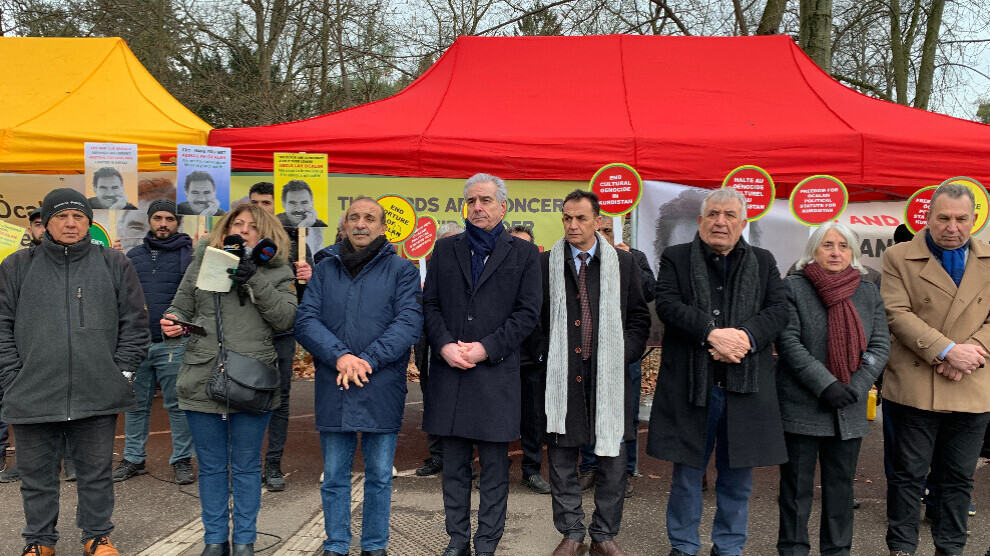Vigil for Öcalan launched in front of the Council of Europe
Kurdish organisations have launched a three-day vigil in front of the Council of Europe in Strasbourg to call for measures to break the information and contact ban on Abdullah Öcalan.
Kurdish organisations have launched a three-day vigil in front of the Council of Europe in Strasbourg to call for measures to break the information and contact ban on Abdullah Öcalan.

A three-day vigil by Kurdish organisations has begun in front of the Council of Europe in Strasbourg on Monday. The aim of the initiative, organised by the European umbrella organisation of Kurdish associations KCDK-E, is to call for measures to break the information and contact ban on Abdullah Öcalan. For about two years now there has been no sign of life from the Kurdish leader, who has been imprisoned in the Turkish island prison of Imrali since 1999. He is neither allowed to see his relatives nor lawyers, a clear violation of the ban on torture. But in the case of Öcalan, Europe is struggling with a consistent commitment to human rights and a responsible response to the injustice institutionalised on Imrali.
The vigil was introduced with a press statement. "The lack of information and communication with the outside world is of great concern to the Kurdish community," said Yüksel Koç, co-chair of the KCDK-E, referring to the protests and actions around the world on the issue of Imrali isolation that have been going on for months. The politician recalled a visit by the Council of Europe's Committee for the Prevention of Torture (CPT), to Imrali last September and addressed the spotty information on the matter.
While the CPT itself indicated that it had met Öcalan, the Asrın Law Office in Istanbul, which legally represents Öcalan and his three fellow prisoners Ömer Hayri Konar, Veysi Aktaş and Hamili Yıldırım, contradicts the CPT's statements and demands the publication of the report on the visit to the island. However, the CPT is only allowed to publish this report after it has submitted its findings and only with the permission of the Turkish government.
"This, in turn, may drag on for years. We know from the past that Ankara has delayed the publication of CPT reports for a very long time. Therefore, we join the demand of the Asrin Law Office and demand that the CPT take coercive measures against Turkey to abolish incommunicado detention. The Kurdish society demands clarification about the CPT's visit to Imrali and information about the condition of the prisoners there. This can only be done if their legal counsel is granted access to the island," Koç said.
Lawyer Ömer Güneş from the Freedom for Abdullah Öcalan Platform described the Imrali isolation as the sealing off of an entire society. "Öcalan's solitary confinement is symbolic of the fate of all Kurds. He has not only been imprisoned, but deprived of any human rights for almost 24 years. The conditions under which Öcalan is being held on Imrali are a new edition of Guantanamo. One can compare Imrali with Guantanamo, certainly. It is only much harder there because of the total isolation. Institutions like the CPT, the European Court of Human Rights and the United Nations know this. They could get this isolation regime abolished. But because they refuse to carry out their missions, they are partly responsible for Öcalan's situation."
Helen Dersim of the Kurdish Women's Movement in Europe (TJK-E) described Öcalan as a key figure for a solution to the Kurdish question. "His release can make a lasting peace possible in Kurdistan, which is divided between the nation states of Turkey, Iran, Iraq and Syria, but also everywhere else in the Near and Middle East. Because he is the only actor with a solution plan for the multiple problems of a region that has been a permanent theatre of war for years. Öcalan is an architect for freedom and peace and stands behind the idea of equal coexistence of all people. It is to his paradigm that we are fully attached. Peace offers the only solution and Öcalan is essential for this process. However, without Öcalan's participation, no progress could be made towards a solution. Before negotiations on this can begin, the Turkish state must first release him. Just as Nelson Mandela was released before and not after the South African negotiations. Otherwise, at most, there could only be talks and no actual negotiations. Mandela stressed that only free persons and not prisoners could negotiate for a political solution."
Other statements were made by Ahmet Karamus, co-chair of the Kurdistan National Congress (KNK), former HDP MP Nursel Aydoğan, the former mayor of Siirt, Selim Sadak, and Kamuran Berwarî, ex-lecturer at Duhok University in the Kurdistan Region of Iraq. Mehmet Cengiz from the Alliance of Democratic Forces in Europe (ADGB), which unites left organisations from Turkey, also spoke. He joined the demands for the lifting of the Imrali isolation and declared that the ADGB would stand in solidarity and support for the Kurdish people in their struggle for the freedom of Abdullah Öcalan".
The vigil in Strasbourg will continue until Wednesday. On Tuesday, the action will be organised by Fed-Gel, an association organised in Baden-Württemberg and Bavaria, together with the Federation of Democratic Societies of Kurdistan in Saarland and Hesse (FCDK-KAWA). At the end of the initiative, a rally is scheduled for the last day.